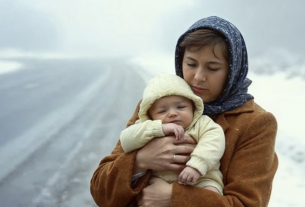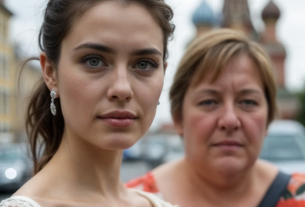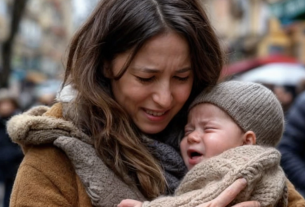Oh, you’re still here? I thought you had already moved out,” the woman at the door tossed a strand of light hair over her shoulder and gave me an assessing look as if I were furniture that needed to be removed. “Clear out the apartment, I’m the new wife of your husband, I’ll be living here!”
The smile on her face was flawless—like something from a toothpaste advertisement, but colder than the January wind. I froze, my fingers gripping the door handle, and one thought echoed in my mind: this can’t be happening. It’s some kind of mistake, a ridiculous prank, a nightmare. But reality was too painfully tangible to dismiss.
The morning was damp and dreary. I woke up alone—again. Roman had gone to work without saying goodbye—again. There wasn’t even a note on the table, nothing in the phone. Lately, it had become a habit. We had turned into neighbors living on different schedules, and each day felt more foreign and empty.
I was brewing jasmine tea when the doorbell rang. I threw on an old sweater over my T-shirt and shuffled to the door. I thought it was the courier with another package for the photo studio. But instead, there she was. A blonde with cherry-red manicured nails. A coat that barely covered her knees, with a handbag worth half my photography equipment. And that same victorious smile.
“Who are you?” I barely managed to squeeze out, feeling as if my tongue had stiffened.
“Natalia. But you can just call me Natasha,” she pushed past me into the hallway as though I had already agreed to let her in. “Didn’t Roma tell you? Oh dear, how inconsiderate of him. Though he’s always been… indecisive on certain matters.”
My apartment. My hallway. And some woman in it talking about my husband like he was an old acquaintance. I felt my fingertips go numb, as though the blood had stopped circulating. The room started to spin slowly around me, but I forced myself to focus.
“Leave,” I said quietly, but my voice sounded so fragile, as if it belonged to someone else.
“Oh, come on,” she continued walking into the living room, heels clicking on the parquet floor. “Mmmm, quite cozy. Although, I’ll change the curtains. And this sofa… not my taste. But overall, it’s livable.”
The sofa Roman and I had chosen three years ago. The curtains I sewed myself when I first started learning to use a sewing machine. Every item in this room was a part of our story, our memories. And now this woman, like the owner of the place, was discussing them with the same indifference as if she were choosing fruit in a supermarket.
“I said—leave!” My voice rose an octave, echoing off the walls.
“Listen, Yanushka,” she turned around, leaning on the back of a chair as if she was already the hostess here. “Let’s not make this a drama.”
I understand, it’s unpleasant. But that’s life. Roma and I will be getting registered soon. He said he’d explain everything to you…
No. No. No.
“Out,” I grabbed her by the elbow and dragged her toward the door. The expensive coat wrinkled under my fingers. “Out of my house!”
To my surprise, she didn’t resist. She let me push her out the door. On the threshold, she only turned around, fixing her hair:
“He’ll be back in an hour. You can ask him yourself if you don’t believe me. Oh, and by the way, the apartment is in his name. Are you aware of that?” Her voice turned cold. “You’ve got a couple of days to pack. I’ll understand.”
The door slammed shut. I slid down the wall to the floor. My head was a vacuum. No tears, no screams. Just a deafening emptiness and the realization that all my suspicions, all the warning signs from the past months, were adding up into one ugly picture.
My phone buzzed in the pocket of my sweater. A message from Roman: “I’ll be there in 30 minutes. We need to talk.”
I stared at those words, and my ability to feel began to return. A wave of heat swept through me. With every beat of my heart, it wasn’t pain that grew, but rage. Thirty minutes. I had thirty minutes to figure out how to meet the person who had just destroyed our life.
The click of the lock. The sound of his footsteps. I stood in the middle of the living room, straightening my back, hands clenched into fists. Roman froze in the doorway. His gaze was panicked, like that of a caught thief. He looked paler than usual, his tie untied, the top button of his shirt undone.
“She already came, didn’t she?” he asked quietly.
No denials. No justifications. Just the end. The end of everything that had been between us.
“Three years, Roma,” my voice sounded surprisingly calm. “Three years of marriage, and you couldn’t even find the courage to tell me to my face.”
He walked in, tossed the keys on the chest of drawers. The familiar gesture. How many times had I heard that sound—the metal hitting the wood—and rejoiced that he was home?
“I wanted to tell you myself,” he ran his hand through his hair. “It’s just… things didn’t go according to plan.”
“Not according to plan?” I repeated. “What the hell plan, Roma? The plan to dump your wife and replace her with a model from a car dealership?”
“She’s a realtor,” he corrected me automatically, and I almost laughed at the absurdity of that clarification.
“Oh, of course. That changes everything,” I felt bitterness rise inside me. “When? How long has this been going on?”
He went to the bar and poured himself some whiskey. He didn’t offer me any—he knew I didn’t drink hard alcohol.
“Six months,” he said, taking a sip. “At first, it was just flirting. Then… everything changed.”
Six months. Half a year. That’s when he started distancing himself. That’s when I noticed the first signs, but I dismissed them, thinking it was because of his work stress or my own issues with the photo studio.
“And when were you planning to tell me?”
He turned away, looking out the window. It was drizzling—small, annoying rain that blanketed the city in a gray haze.
“Well, in a few days, then the divorce, then the registration with her. I wanted to do everything… civilized.”
“Civilized,” I repeated his words like an echo, as if trying to find some sense in them. “Getting engaged to another woman behind your wife’s back is civilized?”
He turned to face me abruptly, and there was irritation in his gaze, mixed with something resembling shame.
“Let’s not make this melodramatic, Yanushka,” he said in a tone he had never used with me before. “You felt it too, that everything was long over! We’ve been living like neighbors. You’re always in your room, I’m always at work. When was the last time we had a real conversation?”
“Don’t you dare shift the blame!” I cried, stepping toward him so close I could see every wrinkle on his face. “Don’t you dare make me an accomplice in your betrayal!”
His face tensed, and he slammed his glass onto the table so hard that a few drops of whiskey spilled onto the polished surface. He didn’t even try to wipe them up.
“I’m not shifting the blame. I’m just stating a fact: our marriage died long before Natasha. She… she’s young, light. With her, I feel alive.”
Every word felt like a blow to my ribs, leaving deep wounds that couldn’t heal. I looked at the man I had woken up next to for a thousand days and saw a stranger. This was no longer the Roman I knew. His voice was cold, and his eyes were empty.
“The apartment is in my name, from before the marriage,” he continued in a businesslike tone, as if discussing another work project. “Legally, I’m not obligated…”
“Spare me the legal details,” I interrupted, trying to stay calm, though everything inside me was boiling. “You’ve made up your mind. I understand.”
A strange numbness overtook me. Inside, there was emptiness, as though someone had removed everything that once mattered. I no longer felt pain or anger—just a strange sense of detachment.
I went to the bedroom, grabbed the suitcase from the closet. I started packing, methodically, neatly, as if I were going on a planned trip. Every item I touched seemed like a symbol of the past, which now no longer mattered.
Roman watched me, leaning against the doorframe, as though he were observing a stranger.
“You can stay at your mom’s for now. Or I’ll pay for a rental apartment until you…”
“No need,” I cut him off without turning my head. “I don’t need anything.”
The walls were decorated with our photos—wedding pictures, vacation photos, happy faces that now seemed like painted actors in someone else’s story. I took the frames off, pulled out the photos, and placed them in front of him on the chest of drawers.
“You won’t need these either,” I said, feeling my fingers tremble slightly.
My throat burned with words—thousands of words. About betrayal. About pain. About how I had loved him. But I stayed silent. I zipped the suitcase. Checked my phone in my pocket—making sure I hadn’t forgotten anything.
“Where are you going now?” he asked when I headed toward the door.
“What difference does it make to you?” I tossed over my shoulder without looking back.
He didn’t answer. Didn’t try to stop me. He just stood there, watching as I walked out of the apartment, which I had considered our home. Step by step, I was leaving not just a place, but a part of my life behind—the part that no longer belonged to me.
Only in the taxi, watching the gray buildings and people under umbrellas pass by outside the window, did I feel the first tear roll down my cheek. Just one. Like a confession of defeat. But even that tear wasn’t hot—it was cold, as if someone else had cried it.
Life at my mom’s began with a long sleep. I fell into the darkness like a stone in a deep well. For two days, I barely got out of bed. The world around me seemed like a blurred stain, with all the sounds and colors muffled.
Mom came in, left food, and quietly stroked my head. She didn’t ask questions—I was endlessly grateful for that. Her silence was the support I had so desperately needed.
On the third day, I woke up with the first rays of the sun. Something had changed. In my chest, instead of pain, there was emptiness, but not bottomless—it felt like a canvas waiting for the first brushstroke. I went to the kitchen and made coffee. Mom was already awake—checking her students’ notebooks.
“Good morning,” she looked at me over her glasses.
“Good morning,” I suddenly realized my voice sounded normal for the first time in days. “Thank you for giving me time.”
She set down her pencil.
“Have you decided what to do next?”
I didn’t know. Or maybe I did, but was afraid to say it out loud. The fear of failure, the fear of starting over—it had always been buried deeper inside me than I thought.
“I need a studio,” I said, surprising myself. “A real one. Not a corner in the apartment, but a place where people will come.”
Mom smiled.
“Valentina’s son on the first floor rents out a space. It used to be a flower shop.”
And so began my path back—to the real me.
The old flower shop turned out to be perfect: big windows, good lighting. The rent was steep, but I took out a loan. For the first time in my life, I took a risk. I thought: it can’t get any worse than this.
I worked like a madwoman. Days—renovations, evenings—shooting for the clients I managed to find. Sleeping five hours a night. Sometimes crying from exhaustion. But inside, something new was growing—confidence, something I had never had before.
A month later, the walls of the studio were decorated with my best works. I created a page on VK. The neighbor, the owner of the bakery, suggested I do a photoshoot for his new desserts.
People started coming, first one, then more.
Mom once said:
“You’ve changed, Yanushka.”
“In what way?”
“Your eyes are shining. Like they used to, before Roman.”
I realized she was right. Something had returned—that which had been buried, covered under layers of “comfortable” relationships, where I was always adjusting, shrinking, quieting myself.
One day, a man came to the studio with a girl about seven years old. She was holding his hand tightly, looking around nervously.
“Pavel,” he introduced himself. “And this is Sonya, my daughter. We wanted a portrait for Grandma’s birthday.”
There was something special about him—calm confidence, a soft gaze. I noticed a wedding ring and felt a strange sting of disappointment.
“Couldn’t your wife come?” I asked as I set up the camera.
“She’s not with us anymore,” he answered simply, without drama. “Illness.”
During the shoot, Sonya warmed up. She laughed, posed, and then saw my old camera on the shelf.
“Can I try?”
I handed her the camera. She frowned in concentration, looking through the viewfinder, and clicked the shutter. Her father watched us, and there was something warm, sunny, in his gaze.
“First steps of a future photographer,” he smiled.
When they left, Pavel lingered in the doorframe.
“You take amazing portraits. Not just pictures—stories.”
“Thank you,” I felt myself blush, like a schoolgirl.
He came back a week later. Alone. With a box of pastries and awkwardly said:
“Sonya said I should thank you. The photos turned out amazing. Grandma cried from happiness.”
We drank tea right in the studio. We talked about photography, his job—he turned out to be an engineer, about Sonya, about music, about books. There was no awkwardness, no tension. Just two people who had heard each other.
He started stopping by. Sometimes with Sonya, sometimes alone. One day, he brought a small package.
“This is for you,” he said, handing me a gift. “Actually, for the studio.”
Inside was a frame, and in it—a photograph. I recognized the moment: last Saturday, a workshop for kids.
I was showing how to hold the camera properly, laughing at something. He had captured the moment when I didn’t know I was being photographed.
“I decided to try,” he said with a smile. “Your influence.”
In the photo, I saw myself as I truly was—alive, passionate, happy.
“You know what’s the strangest thing?” Pavel said, looking at me. “Sonya and I were looking for a photographer for a portrait. But we found so much more.”
Rumors reached me from my ex-husband. They said his new wife had quickly gotten tired of family life, that they were constantly arguing.
That he rarely came to that apartment now.
It didn’t bother me anymore. It felt like it was about characters in a book I’d read long ago.
“I thought I’d fallen into an abyss,” I said to Pavel when he once asked about the divorce. “But really, I just found something at the bottom that I hadn’t noticed before.”
“What was it?” he asked, and his fingers gently touched mine.
“Me,” I answered. “And I won’t be a stranger in my own life anymore.”



